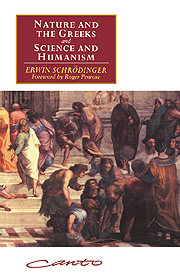Book contents
- Frontmatter
- Contents
- Foreword
- NATURE AND THE GREEKS
- I The motives for returning to ancient thought
- II The competition, reason v. senses
- III The Pythagoreans
- IV The Ionian Enlightenment
- V The religion of Xenophanes. Heraclitus of Ephesus
- VI The Atomists
- VII What are the special features?
- References
- SCIENCE AND HUMANISM
IV - The Ionian Enlightenment
Published online by Cambridge University Press: 05 July 2014
- Frontmatter
- Contents
- Foreword
- NATURE AND THE GREEKS
- I The motives for returning to ancient thought
- II The competition, reason v. senses
- III The Pythagoreans
- IV The Ionian Enlightenment
- V The religion of Xenophanes. Heraclitus of Ephesus
- VI The Atomists
- VII What are the special features?
- References
- SCIENCE AND HUMANISM
Summary
Turning now to the philosophers usually classed together under the name of the Milesian School (Thales, Anaximander, Anaximenes) and, in the next chapter, to some more or less connected with them (Heraclitus, Xenophanes), then to the atomists (Leucippus, Demo-critus), let me point out two things. First, the order in regard to the preceding chapter is not chronological; the floruit of the three Ionian ‘physiologoi’ (Thales, Anaximander, Anaximenes) is approximately dated at 585, 565, 545 B.C. respectively, as against Pythagoras 532 B.C. Secondly, I wish to point out the double role that this whole group plays in our present context. They are a group of definitely scientific outlook and aims, just as the Pythagoreans were, but opposed to them as regards the competition ‘Reason v. Senses’, explained in our second chapter. They take the world as given to us by our senses and try to explain it, not bothering about the precepts of reason any more than the man in the street does, from whose way of thinking theirs is a direct descendant. Indeed it frequently starts from problems or analogies of handicraft and serves practical applications in navigation, mapping, triangulation. On the other hand let me remind the reader about our main problem, which will be to find out the special and somewhat artificial features of present-day science that are supposed (Gomperz, Burnet) to originate from Greek philosophy.
- Type
- Chapter
- Information
- 'Nature and the Greeks' and 'Science and Humanism' , pp. 53 - 68Publisher: Cambridge University PressPrint publication year: 1996



